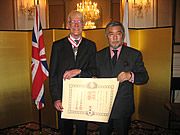 |
Ambassador Nogami with Professor Stockwin
|
Ambassador, Ladies and Gentlemen,
I feel most honoured to be awarded the Order of the Rising Sun with gold rays and neck ribbon. When I first heard about this award, I was astonished. And then reflecting on it, I came to the conclusion that the honour reflected not just my efforts alone, but the efforts of our whole team in Japanese studies at the University of Oxford. Over the past twenty years and more, we have worked closely together at the Nissan Institute of Japanese Studies, but also with our colleagues at the Oriental Institute, at St Antony's College, at the Bodleian Japanese Library and at various other departments of the University. In addition, our efforts have been enormously assisted by two successive funding grants by the Nissan Motor Co. Ltd.
Let my say a little about what we have sought to achieve since the foundation of the Nissan Institute in 1981.
We have consistently held to a general philosophy of seeking to inject the study of Japan into what we like to call "mainstream" curricula of the University. As well as teaching Japanese and about to Japan to students specialising principally in the study of Japan, my economist colleagues, for instance, teach in depth courses on the Japanese economy as part of general teaching on economics.
One thing we do (and by "we" I mean those involved in Japanese studies generally, not just at the Nissan Institute) is teach an undergraduate honours degree in Japanese. This is a four-year course, but most students spend a year in Japan between their third and fourth years (in addition to a term spent in Japan during their first year), so that those students graduate five years after beginning the course. We have introduced options in the social sciences and the liberal arts, linguistics and so on, so that a student will have the opportunity to study in depth, say, the politics of Japan, or Japanese society. We expect students to have achieved full working fluency in speaking, reading and writing Japanese by the end of the course. What students are expected to do is of course highly testing. We expect them to learn a difficult language, learn an academic discipline, and apply that discipline to Japan.
Following the general philosophy I mentioned earlier, we teach courses, principally on the Japanese economy, society, politics and modern history as optional units of study to students in other Departments. These students normally do not know the language, but they can apply their own particular academic discipline to the study of Japan.
We train considerable numbers of postgraduate (Masters and Doctoral) students in politics, social anthropology, economics, modern history, literature, linguistics etc. relating to Japan. We insist on a high level of Japanese language competence in order to write postgraduate theses on Japan. At one stage we were supervising over 30 postgraduate students writing theses on aspects of Japan.
The Bodleian Japanese Library has built up a collection of more than 100,000 volumes in Japanese, English and other languages relating to many sides of Japanese life and history. It is one of the finest collections in Europe on Japan.
We have been most active in the field of publications. More than 60 volumes have now been published in what is now called the Nissan Institute/Routledge Curzon Japanese Studies Series on subjects ranging from the training of Japanese engineers to Japanese science fiction. We publish an Occasional Papers series, deriving from our regular seminars held weekly in term time. All of us have also published our own work in our respective fields.
Over time, we have brought to Oxford considerable numbers of Japanese visitors, mostly academics from universities in Japan. This has helped us to built up networks of contacts in Japan, and establish links with Japanese universities and other institutions. Our Japanese visitors have conducted valuable research and brought out publications during and after their stays with us.
We have all been involved in a variety of external activities. For instance my colleague Dr Jenny Corbett has established a network of economists (mostly European) specialising in the Japanese economy. I myself helped found and organise the Japanese Politics Colloquium, which holds annual conferences to pool research on the evolving political system of Japan. My colleague Dr Brian Powell, being a Kabuki specialist, produces Kabuki plays in Oxford. Memorably, in 1994, his English translation of Genboku and Choei, by the early twentieth century dramatist, Mayama Seika - a play about the introduction of smallpox vaccine to Japan in the 1840s requiring only two actors - was performed in the Lecture Theatre of the Nissan Institute. Dr Powell played the respectable Genboku and I played the anarchic Choei.
In conclusion, let me say how rewarding it has been to be part of the Japanese studies community in the United Kingdom and of course beyond. People have been extraordinarily supportive and the past two decades have of course been a fascinating period in which to observe developments in Japan. We are grateful to the various funding bodies that have supported our efforts, and not least, to the Japanese Embassy here in London.
Ambassador, thank you so much for the award, and for your support.
|


